Introduction
Do Guinea Pigs Eat Celery: Guinea pig can safely eat both celery stalks and leaves in moderation. Just make sure you rinse them off before feeding a small bite to your guinea pig. Guinea pigs, those charming and sociable rodents cherished as household pets, are known for their herbivorous diets. These small mammals thrive on a variety of fresh vegetables and fruits, making them popular additions to many families.
Celery, with its crisp texture and mild, earthy flavor, is a common vegetable found in many kitchens. Guinea pigs have specific dietary requirements, and introducing new foods like celery should be approached with care. We will examine the potential benefits and risks associated with feeding celery to guinea pigs and provide guidance on how to incorporate this vegetable into their diet, ensuring their health and happiness. So, if you’re a guinea pig owner or simply curious about these adorable creatures’ nutritional needs, read on to discover whether celery is a tasty and nutritious treat for your furry friends.
Celery is a low-calorie vegetable that is often appreciated for its crunchy texture and high water content. However, it’s important to understand that guinea pigs have specific dietary needs, and some human foods can be detrimental to their health. In the case of celery, it is generally considered safe for guinea pigs in moderation due to its fiber content and certain vitamins and minerals.
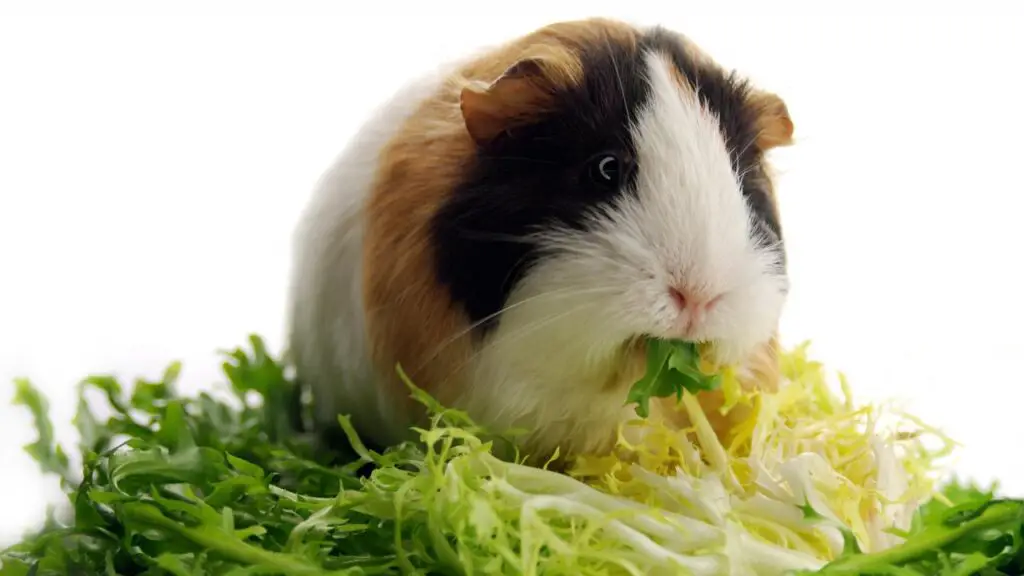
Can guinea pigs go without vegetables?
Guinea pigs’ need fresh greens and vegetables every day to help them get enough vitamin C (they can’t produce it themselves). Our vets’ advise one teacup of greens and veg, per guinea pig, per day, which can be split into morning and evening feeds.
Guinea pigs are herbivorous animals with specific dietary requirements, and while they can technically survive without vegetables, it is not recommended for their overall health and well-being. A diet consisting solely of hay and pellets, which are the primary staples for guinea pigs, might provide them with essential nutrients, but it can lead to several health issues and deficiencies.
Vitamins and Minerals: Vegetables provide essential vitamins (such as vitamin C) and minerals (like calcium) that are vital for guinea pig health. These nutrients help prevent diseases like scurvy and ensure healthy bone development.
Fiber: Vegetables contain dietary fiber, which aids in digestion and helps prevent gastrointestinal problems like constipation and bloating.
Hydration: Many vegetables have a high water content, which helps keep guinea pigs well-hydrated, especially during hot weather.
Variety: A varied diet, including a range of vegetables, keeps guinea pigs mentally stimulated and prevents dietary boredom.
Not all vegetables are suitable for guinea pigs, and some can be harmful. It’s crucial to research and offer safe options like leafy greens (e.g., romaine lettuce, kale), bell peppers, and cucumber. Additionally, fresh vegetables should be introduced gradually to avoid digestive upset. While guinea pigs could technically survive without vegetables, they thrive on a diet that includes a variety of fresh vegetables alongside hay and pellets. Providing a balanced diet is essential to ensure their health, happiness, and longevity.
Can guinea pigs eat potatoes?
The Most Dangerous Vegetables for Guinea Pigs is Guinea Dad because their digestive system may also struggle to process the starch in potatoes. Additionally, potato skins contain alkaloids that can be toxic to guinea pigs and cause diarrhea and other health problems. Therefore, it’s crucial to never feed your guinea pigs raw or cooked potatoes, including the skins.
Guinea pigs should not be fed potatoes, whether they are raw, cooked, or in any form. Potatoes, along with their skins, contain compounds known as glycoalkaloids, particularly solanine and chaconne, which are toxic to guinea pigs and many other animals.
Consuming even a small amount of potato, especially the green parts or any potato sprouts, can lead to various health problems in guinea pigs. These toxic compounds can cause digestive issues, including nausea, vomiting, and diarrhea. In severe cases, potato consumption can lead to more significant health concerns such as lethargy, abdominal pain, and even organ damage.
It’s essential to prioritize the well-being of your guinea pig by offering a diet that is safe and nutritionally balanced. Instead of potatoes, focus on providing fresh, guinea pig-friendly vegetables such as leafy greens (e.g., romaine lettuce, spinach), bell peppers, carrots, and cucumbers. These vegetables are not only safe but also contribute to a healthy and balanced diet for your furry friend.
Always be cautious when introducing new foods to your guinea pig’s diet and ensure that they are offered a variety of vegetables to meet their nutritional needs. Water-rich, vitamin C-rich veggies are particularly important, as guinea pigs cannot synthesize vitamin C on their own and rely on dietary sources to prevent scurvy and maintain overall health.
Are guinea pigs allowed rice?
Rice should not be fed to your guinea pig for many reasons. Cooked foods should never be fed to these animals as it can badly harm their digestive system. Since their digestive system depends mainly on bacteria to extract healthy nutrients, if you drop a complex carb in there, it can give them an upset stomach.
Guinea pigs are herbivorous animals with specific dietary requirements, and rice is not a natural part of their diet. While rice itself is not toxic to guinea pigs, it is not a recommended or suitable food for them. Guinea pigs thrive on a diet that primarily consists of fresh hay, fresh vegetables, and high-quality guinea pig pellets.
Rice lacks the essential nutrients that guinea pigs need to maintain good health. It is primarily a source of carbohydrates and lacks the necessary fiber, vitamins, and minerals that are crucial for a guinea pig’s well-being. Feeding rice to guinea pigs can lead to nutritional imbalances and may not provide the essential nutrients they require.
Guinea pigs have sensitive digestive systems, and introducing new or unfamiliar foods can upset their stomachs and lead to digestive issues, including diarrhea and gas. Providing a varied and balanced diet is essential for their well-being, and it’s essential to avoid foods like rice that do not contribute positively to their dietary requirements. Always consult with a veterinarian or an experienced guinea pig owner for guidance on providing the best diet for your pet.
Can guinea pigs eat garlic?
Guinea pigs can’t eat anything from a bulb, which includes onion and garlic. Garlic is not toxic to guinea pigs, but it is not a recommended part of their diet. It is high in oxalates, which can interfere with the absorption of calcium in the body.
Guinea pigs should not be fed garlic or any related foods from the Allium family, including onions, leeks, and chives. These vegetables contain compounds known as thiosulfates, which are toxic to guinea pigs and can lead to serious health issues.
Consuming garlic can result in various adverse effects on guinea pigs, including gastrointestinal distress, such as stomach pain, diarrhea, and vomiting. In severe cases, garlic toxicity can cause more significant health problems, including damage to red blood cells and anemia.
Guinea pigs have sensitive digestive systems, and their dietary requirements are quite specific. They thrive on a diet that consists primarily of fresh hay, fresh vegetables, and high-quality guinea pig pellets designed to meet their nutritional needs. Garlic and other Allium family vegetables do not provide the necessary nutrients and can be harmful.
It’s crucial for guinea pig owners to be aware of safe and appropriate foods for their pets. Instead of garlic, focus on offering a variety of fresh vegetables like leafy greens (e.g., romaine lettuce, spinach), bell peppers, carrots, and cucumbers to provide the necessary vitamins and minerals for your guinea pig’s well-being.
Is a guinea pigs Favorite food?
Guinea pig is different, and most will have a specific favorite food or foods. Good bets are carrots and carrot tops, cucumber and dandelion leaves. If your guinea pigs don’t have regular access to grass then a big juicy handful will elicit excited squeaks from most guinea pigs, young or old.
Guinea pigs, like many animals, have individual preferences when it comes to food. While they don’t necessarily have a single “favorite” food that applies universally to all guinea pigs, some foods tend to be more popular among them due to taste and nutritional value.
One of the most commonly liked foods by guinea pigs is fresh, high-quality hay. Timothy hay, in particular, is a staple in their diet and provides essential fiber for proper digestion and dental health. Fresh grass is also a favorite treat for many guinea pigs.
In terms of vegetables, guinea pigs often enjoy leafy greens like romaine lettuce, spinach, and kale. Bell peppers, carrots, and cucumbers are also well-received. These vegetables are not only tasty but also rich in essential vitamins and minerals, especially vitamin C, which is crucial for guinea pigs since they cannot synthesize it on their own.
It’s important to that guinea pigs have sensitive digestive systems, and introducing new foods should be done gradually to avoid stomach upset. Additionally, while they may have preferences, variety is key to a balanced diet for guinea pigs, as it ensures they receive a wide range of nutrients.
Is anything poisonous to guinea pigs?
Guinea pigs should be fed up with the following foods (this is not an exhaustive list): cereals; grains; nuts; seeds; dried beans, corn, and peas; buttercups; garden shrubs (such as hemlock or privet); lilies of any kind; sweet peas; nightshade; oak; avocado; onion grass; onions; potato tops; mushrooms. Several foods and substances are toxic or potentially harmful to guinea pigs, and it’s crucial for their well-being to avoid these items:
Foods in the Allium Family: Garlic, onions, leeks, and chives contain compounds that can damage a guinea pig’s red blood cells and lead to anemia. These foods should be strictly avoided.
Chocolate and Caffeine: These contain theobromine and caffeine, which are toxic to guinea pigs and can cause various health issues, including seizures and heart problems.
Processed and Sugary Foods: Sugary snacks, candies, and processed human foods can disrupt a guinea pig’s delicate digestive system and lead to obesity and dental problems.
High-Calcium Foods: Foods high in calcium, such as dairy products and spinach, can contribute to the formation of bladder stones in guinea pigs.
Avocado: Avocado contains a substance called pepsin that is toxic to guinea pigs and can lead to digestive upset and other health problems.
Nuts and Seeds: These foods are high in fat and can be hard for guinea pigs to digest, potentially leading to obesity and digestive issues.
Toxic Plants: Some houseplants and outdoor plants are toxic to guinea pigs if ingested. It’s essential to ensure that guinea pigs cannot access potentially harmful plants.
Guinea pigs have sensitive digestive systems and specific dietary needs. Providing a balanced diet of fresh hay, fresh vegetables, and high-quality guinea pig pellets, along with access to clean water, is essential for their health. When in doubt about the safety of a particular food or substance, consult with a veterinarian who is knowledgeable about guinea pig care to ensure their safety and well-being.
Can guinea pigs eat roses?
Guinea pigs can also be eaten by cavies in small quantities (5 to 10 grams, 2 to 3 times a week). Guinea pigs cannot produce their own Vitamin C, they need a little help from us humans. Guinea pigs can technically eat small amounts of roses, but it’s generally not recommended to include them in their regular diet. While roses themselves are not toxic to guinea pigs, there are some considerations:
Pesticides and Chemicals: Most roses that are commercially grown, including those found in gardens and floral shops, are often treated with pesticides and other chemicals. These chemicals can be harmful to guinea pigs if ingested. It’s essential to ensure that any roses offered to your guinea pigs are free of such substances.
Thorns and Stems: The thorns and woody stems of roses can pose a choking hazard or cause injuries to guinea pigs if not removed. Therefore, if you decide to offer roses, make sure they are free of thorns and tough stems.
Limited Nutritional Value: Roses do not provide significant nutritional benefits to guinea pigs. While they are not harmful in small quantities, they should not replace the primary components of a guinea pig’s diet, which include fresh hay, fresh vegetables, and high-quality guinea pig pellets.
There are more nutritionally valuable and safer options for treats, such as small pieces of safe fruits and vegetables like bell peppers, cucumbers, or strawberries, which can be given in moderation to add variety to their diet. Always monitor your guinea pig’s reactions to new foods and treats and consult with a veterinarian if you have any concerns about their dietary choices or potential allergies.
What fruits do guinea pigs love?
Fruit works well as an occasional treat that is offered once a day or several times a week. Keep the portion size small since fruit is high in sugar; a small wedge of orange or apple, several blueberries or a thin slice of banana is perfectly adequate. Kiwis, strawberries and citrus have high levels of vitamin C.
Guinea pigs have a natural fondness for fruits, which can serve as delicious treats in their diets. However, it’s crucial to remember that fruits should be given in moderation because of their high sugar content.
Apples: Guinea pigs often enjoy the sweet, crisp texture of apples. Remove the seeds and core, as they contain small amounts of cyanide, which can be harmful.
Strawberries: Strawberries are a favorite among guinea pigs due to their juicy and sweet nature. Offer them in small, bite-sized pieces.
Oranges: Citrus fruits like oranges can provide vitamin C, which is essential for guinea pigs. However, they are acidic, so offer them in moderation.
Blueberries: These tiny fruits are packed with antioxidants and are a hit with many guinea pigs. They are also low in sugar compared to some other fruits.
Kiwi: Rich in vitamin C and fiber, kiwi can be a refreshing treat for guinea pigs. Remove the skin and seeds before serving.
Pears: Guinea pigs often enjoy the mild sweetness and juicy texture of pears. Remove the seeds and core.
Grapes: Grapes are a sweet and hydrating option for guinea pigs. Cut them into smaller pieces to reduce choking hazards.
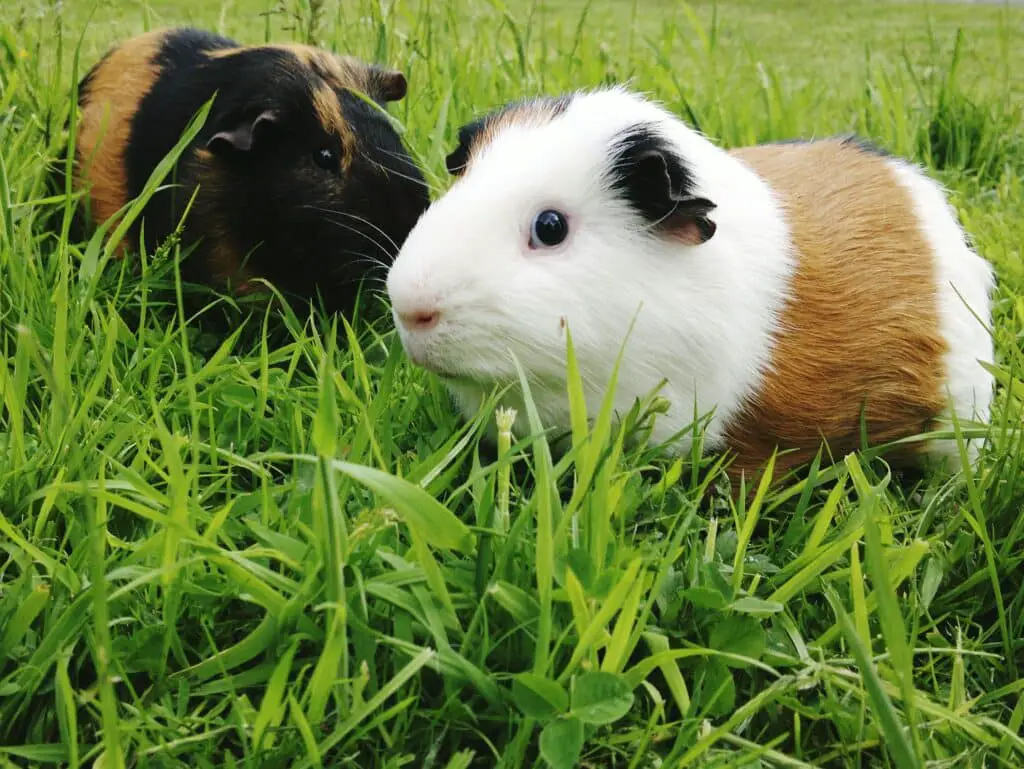
Conclusion
Guinea pigs can indeed eat celery, but it should be offered in moderation and with some precautions. Celery can be a healthy addition to their diet, providing fiber and essential vitamins while helping to promote dental health through the act of chewing.
Due to its high water content and fiber, offering small, manageable portions of celery essential. Overfeeding celery can lead to digestive upset. Ensure that eat celery is thoroughly washed to remove any pesticides or contaminants, as guinea pigs are sensitive to chemicals. Young guinea pigs or those with dental issues might struggle to chew celery’s fibrous strings. In such cases, it’s advisable to offer softer vegetables. Celery should be part of a balanced diet that includes hay, fresh vegetables, and guinea pig pellets, meeting their specific nutritional needs.
Incorporating a variety of fresh vegetables into your guinea pig’s diet can help keep their meals interesting and nutritionally sound. While celery can be a healthy choice when offered thoughtfully, it should complement other suitable vegetables to ensure your guinea pig receives a well-rounded and satisfying diet for their overall health and happiness.

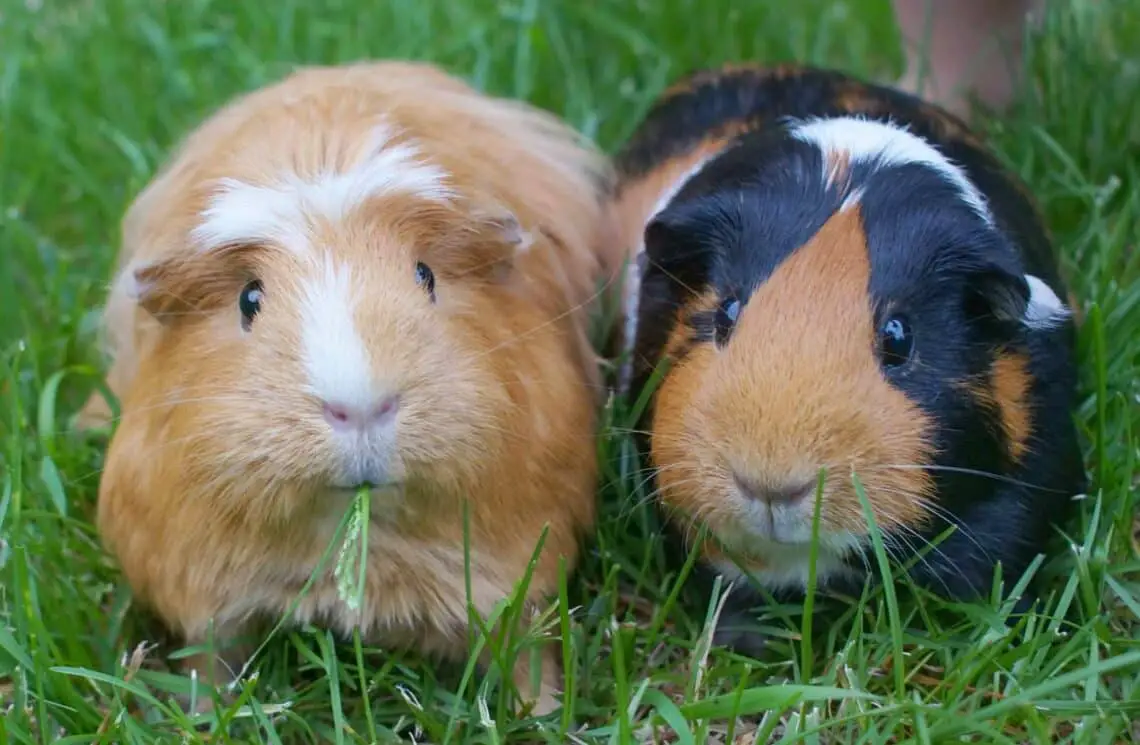
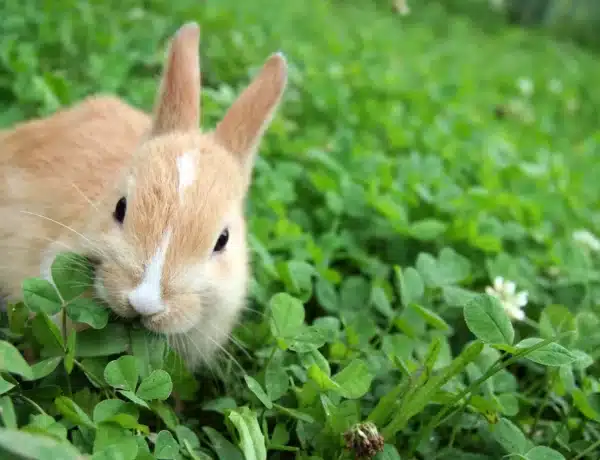
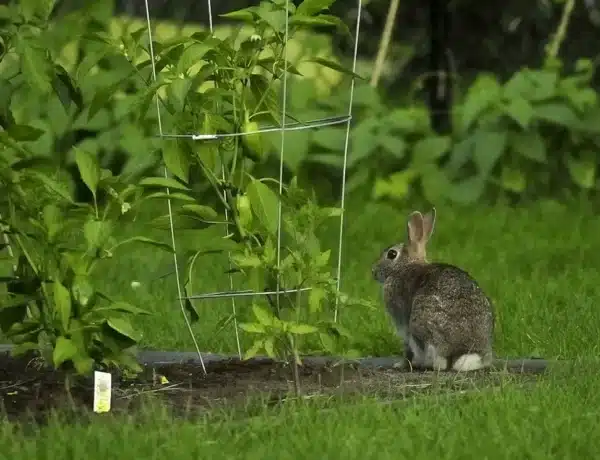

No Comments